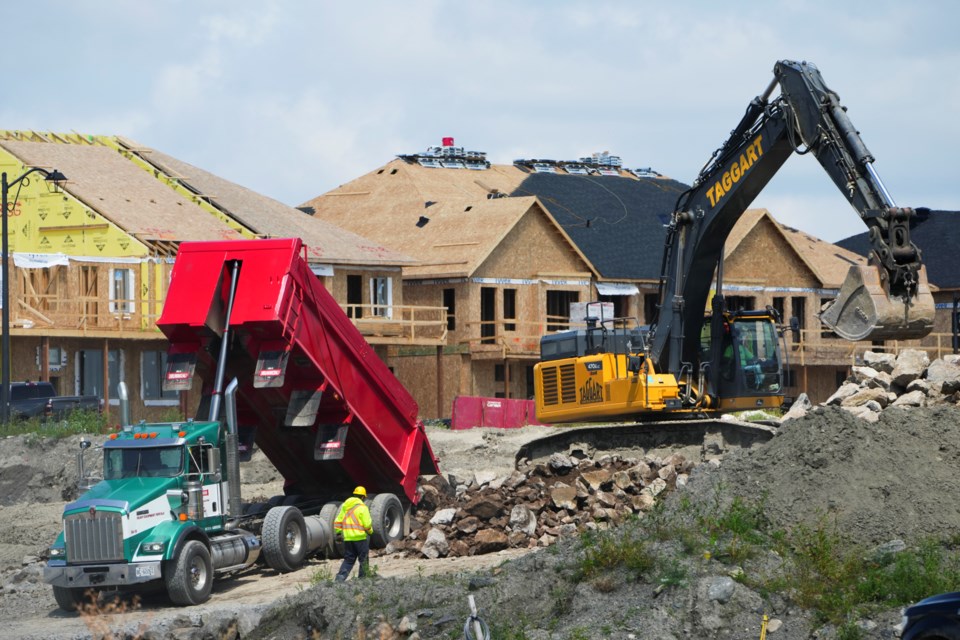While the Ford government still aims to build 1.5 million homes by 2031, Ontario developers think the housing crisis is going to get worse before it gets better, according to a new survey.
Over the summer and fall, 21 development execs told Toronto consultancy StrategyCorp that they were trying to "survive 2025." StrategyCorp released the survey in a report on Tuesday.
"All the developers that we spoke to (are) just hanging on for dear life, trying to get through the next year, in hopes that in 2026 they'll be able to build things," StrategyCorp principal and report contributor Fraser Macdonald said.
"I was shocked by the fear and the sense of dread from the industry — that this is much, much worse than people realize," he said.
Current conditions are a perfect storm for developers.
The report notes that immigration, especially in Ontario, has been high, and supply has lagged well behind demand for years. But there are far more issues at play.
Development charges are a big one. As cities have had to take on more and more responsibilities in recent decades, they've often turned to increasing fees on building housing instead of raising property taxes, which is politically difficult.
Most survey participants flagged "input costs" as a significant barrier to building.
I know I've posted this before but I can't get over it. Just development charges, excluding all other charges and taxes, have increased by 6000% in the City of Toronto over the past 25 years. pic.twitter.com/QIDstmI0BH
— Dr. Mike P. Moffatt 🇨🇦🏅🏅 (@MikePMoffatt) December 2, 2024
"I believe that development charges are an intergenerational wealth transfer from millennials to boomers and it needs to be undone," one builder said in the survey. "Every boomer who bought a house didn’t pay DCs. Every millennial has to pay them."
Cities and towns have demanded a "new deal" with the provincial and federal governments to rejig who pays for what, which could theoretically lower development charges. In Ontario, the NDP, Liberals and Greens have committed to working one out, while the governing Progressive Conservatives have been more hesitant.
Interest rates remain high, which has made borrowing more expensive for developers. The Bank of Canada's overnight rate has come down from 5 per cent to 3.75 per cent via four rate cuts this summer and fall. Housing Minister Paul Calandra has said that will help boost the province's flagging homebuilding numbers.
For now, things are grim.
Housing starts are declining, and detached home starts are on track for the lowest numbers since 1955. Ontario is facing a "brain drain" of young people to other provinces in search of cheaper housing. And homeless shelters are full.
Governments just aren't taking the problem seriously enough, Macdonald said. The machinery of housing approvals can seem "crazy" for builders, he said.
"The process is designed so that every stakeholder gets to add comments at every stage of the process, and what ends up happening is you've got different departments disagreeing on things, or different sort of minor approvals, sending the original approval back to the drawing board, and it's just burying people in process," Macdonald said.
Toronto still uses a paper-based system, he noted. But process problems were felt across the province.
"We lose months, sometimes even years, waiting for permits and zoning adjustments," one builder said.
Other jurisdictions have a single application that takes care of the zoning, official plan, site plan and building permit, which would make life easier for developers, he said.
Still, anxious to make a dent in the issue — or at least appear to be doing so — governments have unleashed a flurry of changes in recent years. Even the positive ones have tripped up developers, they said.
"How are we supposed to complete a $100-million land purchase through our board and investors when the last time they were asked to do so, the money went down the drain because the province changed its mind on urban boundaries again?” one developer said.
In the near future, the provincial government should reform zoning to allow more density, speed up the approval process, and do "everything possible to bring down costs," Macdonald said.
Developers had some "skepticism" about a public builder model, as the NDP has proposed, where the government would build housing directly. But Macdonald said they mostly wanted more details.
"If ... it is giving people land cheaply in exchange for affordable housing targets and letting the builders build, I think people are quite on board for that," Macdonald said.
"I think the more broad observation was they just want people to get on with it."




